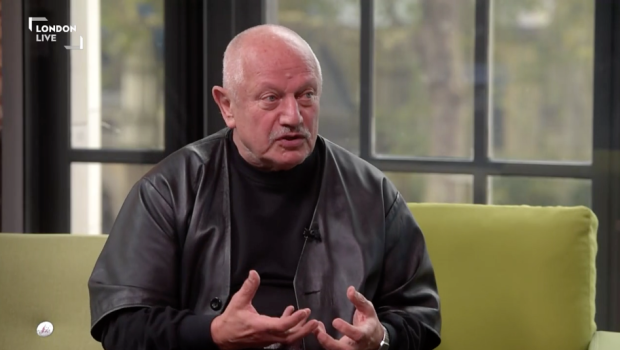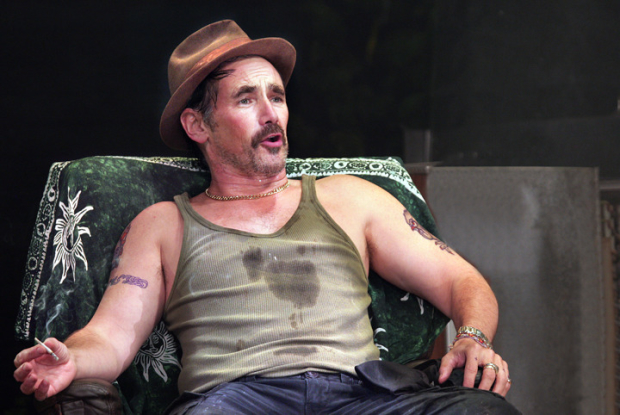Matt Trueman: What planet is Steven Berkoff on?

What planet is Steven Berkoff on? The veteran actor-playwright has fired off a hotheaded diatribe about today’s young actors, claiming that they are "ghastly, uninteresting, boring, tedious" and lack the skills the stage demands. "Most of them are useless."
Look, it’s a big, old red-faced rant from a big, old red-faced ham, and it doesn’t really deserve much more than outright dismissal. It’s a wonder you can hear him waxing lyrical about the titans of yesteryear – "Laurence Olivier or John Gielgud or Ralph Richardson or Alec Guinness or Albert Finney or Peter O’Toole" – through the thick fug of nostalgia in the London Live studio. Sure enough, quicker than you can say ‘What, no women?’, Berkoff’s bemoaning the loss of regional rep and those 50 weeks of work experience before Equity deemed you fit for union membership. "There’s no future," he went on. Well no, not if you’re stuck in the past.
The simple fact is, theatre changes. And as it does, so too does the nature of acting. Yesterday’s greats are tomorrow’s hams. Were Laurence Olivier to step out onstage today and let that legendary voice rip, contemporary audiences would balk at something so OTT. Anyone who caught Trevor Nunn’s Wars of the Roses will understand exactly what I mean. All that jowl shaking, foot planting and saliva spraying just looked plain absurd in 2015 – like so many Rude Mechanicals giving it their all. Acting styles date. Techniques go stale.
In one way, however, Berkoff might have a point. Explaining himself more fully, he talks about the vocal strength and physical skills that actors built up in rep, working on a regular basis, their control of gesture, tone and mannerisms. The sense is of something full-bodied, a performance that uses an actor’s entirety, deploying everything in their armoury over the course of an evening. As stage acting has shrunk, you might argue that we’ve lost something.
There’s a glimpse of that in Richard Eyre‘s new television adaptation of The Dresser, Ronald Harwood’s classic play about an ailing actor-manager known only as Sir and his personal wardrobe assistant. It airs on BBC2 next Sunday evening and in it, we get to see this legendary actor, majestically played by Anthony Hopkins, in full flow as King Lear.
What you see is something extraordinary: a performance so stylised that it looks exotic, not a million miles from Japanese kabuki theatre. Greasepaint makes his face look ghostly pale, with brown triangles on the cheeks for added gauntness and darkened wrinkles to add contours and age. Eyeliner makes his eyes pop out and his straggly wig is wild and unkempt, the sticking plaster beneath clearly visible. Sir’s Lear looks less like a man and more like a puppet of some sort.
When he acts, Hopkins seems to sing the verse, using his voice as an instrument, part-wind, part-percussion, and his gestures are sharp and practised. It’s not natural, not even close, but you get a sense of the visceral power it must have had in the theatre. You’d feel his voice in your body, become hypnotised by something so much larger than life. You imagine him changing the auditorium’s air pressure, as if great acting meant making microclimates. When the young Kenneth Tynan saw Olivier play Oedipus, he described his final scream as if it made the New Theatre’s roof shake: "Some stick of wood must still, I feel, be throbbing from it." (It’s a moment Berkoff himself picks up on in his one-act play The Actor’s Lament.)

© Simon Annand
There are still actors that can have that sort of visceral impact on an audience. Bertie Carvel is one, think of his shrill, clenched and bloodied performance in Bakkai or the wheedling, nasal sycophant he played in Patrick Hamilton’s Rope, also at the Almeida. Kate Fleetwood is another, the intensity of her Lady Macbeth raised the hairs on your skin, or Andrew Scott in Birdland, twirling in that sheeny jacket like some sort of human mirrorball. Of course, only a fool would miss Mark Rylance, summoning giants into the Royal Court as he thumped that resounding drum as Rooster Byron.
However, theatre has changed. Not only are the spaces often smaller – Olivier never played a 70-seat studio theatre – but design has taken on more of a role in affecting an audience. Sound, lighting and directorial decisions, even movement direction, all come together to create mood, tone and atmosphere, thereby freeing the actor from bombast. Today’s actors can afford to do less, but that requires a different skillset entirely: precision instead of power, subtlety instead of starriness, perhaps even transparency instead of transformation.
Again, plenty of examples spring to mind: Angus Wright cradling his daughter, Iphigenia, with a smile as she slipped down the pills that send her to sleep and then to death in Oresteia; Denise Gough, gradually accumulating detail over the course of Adler and Gibb, allowing this maniac to materialise before our very eyes; Christian Roe in The Velveteen Rabbit, barely doing anything more than blinking and yet still managing to break our hearts.
Berkoff is wrong: today’s actors have not gotten worse, nor do they suffer from a lack of stage time. Theatre has changed and actors with it. No future, my arse.










